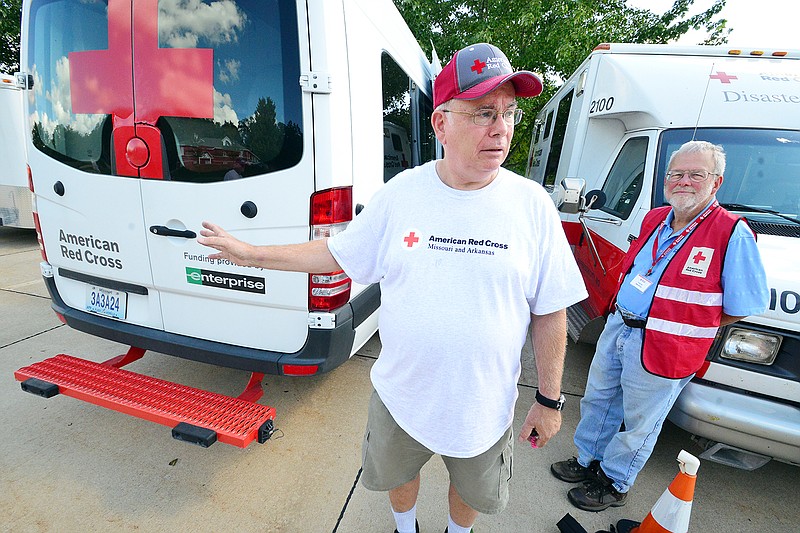With Hurricane Florence bearing down on the Carolinas, a number of Missouri organizations sent personnel to provide relief for victims.
The American Red Cross Central and Northern Missouri chapter sent two teams of volunteers - each with an emergency response vehicle (ERV) - to the East Coast to stage in anticipation of the storm.
Hurricane Florence is designated as a Category 4 storm, meaning it has sustained winds of 130-156 mph.
The teams are to travel to Richmond, Virginia, which is about 250 miles from the region where the monster storm is expected to make landfall, said Bill Grier, who left Jefferson City on Tuesday afternoon. The teams are taking lessons they learned from hurricanes that struck U.S. coasts as recently as last year.
"In Harvey, we deployed a little too close," said Grier, a retired U.S. Army colonel. "You don't want to redeploy, and we don't want to put our workforce in danger."
Harvey was one of the costliest hurricanes on record. Once it came ashore from the Gulf of Mexico, it nearly stopped moving. Its catastrophic four-day rainfall - which set a record of more than 60 inches of rain for a single location caused widespread flooding in Houston. It is estimated to have caused $125 billion in damage and more than 60 deaths.
Because of weather conditions, Florence is expected to move slowly once it makes landfall possibly late Thursday or early Friday near Wilmington, North Carolina.
Once it is safe for the Red Cross teams to be deployed to areas affected most by the hurricane, they'll receive an assignment from emergency personnel.
"Early in the morning, you'll get an assignment, clean the vehicle and pick up meals," Grier said. "Our primary mission will be to do mobile feeding."
The ERVs can hold 400 meals each, he said. During Katrina, he said he was stationed in a parking lot with 75 other ERVs. All made two trips a day to feed neighborhoods.
Working with Grier is Thomas Hafer.
"This is my first deployment," Hafer said. "I hope I can help a lot."
He won't be alone.
The American Red Cross is mobilizing nationally, said Abigail Anderson, Central and Northern chapter executive director.
It is preparing to serve more than 100,000 people.
Sixteen volunteers from the area already deployed to assist storm response efforts and storm victims.
"Our region (Missouri and Arkansas) is deploying 700 people," Anderson said.
Heavy rains and hurricane-force winds are expected for long periods in the Carolinas and Virginia. They will combine to cause widespread power outages, according to forecasters. And Ameren Missouri has received requests for mutual assistance in making repairs to electrical infrastructure, Ameren representative Jenny Hagen said.
However, before it can send help, the Public Service Commission has to confirm the power company is following mutual aid guidelines.
Missouri Task Force 1 also sent people out for emergency and rescue operations, Jefferson City Fire Chief Matthew Schofield said.
The task force is one of 28 urban search-and-rescue teams in the United States, and is designed to help local emergency agencies facing disasters inside and outside Missouri. The Boone County Fire Protection District manages it under Federal Emergency Management Agency guidelines.
FEMA activated the task force as a type III task force Tuesday morning.
The task force is required to have up to 80 personnel available at any given time. The type III deployment means 37 members, highly trained in water rescues, building collapses and other special techniques were deployed with all the task force equipment, Schofield said.
If for some reason, other members of the task force are required, the equipment is already on the ground, he said.
Three Jefferson City personnel - a safety officer, a rescue squad officer and a rescue specialist - deployed Tuesday morning.
Harvey taught emergency personnel a lot about urban search and rescue techniques, Schofield said.
"Because we're a river city, we've invested in a lot in water rescues training," he said. "We're very fortunate in Mid-Missouri to have a federal task force positioned here."

